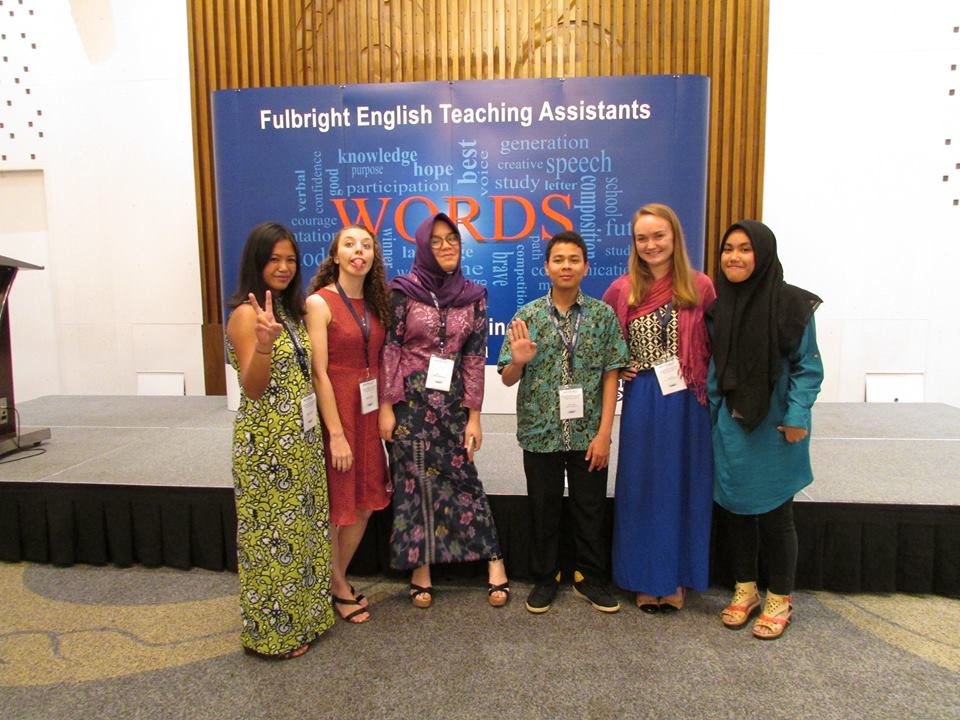
The Fulbright English Teaching Assistantship (ETA) and the Critical Language Scholarship (CLS) Program both emphasize language-learning and cross-cultural experiences. The ETA places recent college graduates and young professionals from the U.S. in classrooms abroad for up to 1 year to provide assistance to local English teachers. ETAs help teach English language while serving as cultural ambassadors for the U.S. The CLS is an intensive two-month scholarship for US students to study a specific language in a country where it is most spoken. The goal of the CLS Program is to increase the number of Americans studying critical languages while creating lasting relationships with people living in other countries.
We talked to Stephanie Clemente, who was Fulbright ETA in Indonesia and Critical Language Scholarship recipient, to learn more about the programs and get some application tips.
1. What inspired you to apply for the Critical Language Scholarship and later the Fulbright ETA in Indonesia?
As a Posse Foundation scholarship recipient, information and timelines for fellowships like the Fulbright ETA were embedded into our psyches as early as my sophomore year at Trinity College. Through a one-on-one Posse workshop with the Director of the Fulbright at the time, I learned about his time as a Fulbrighter in the first cohort sent to Germany after the fall of the Berlin Wall. Germans purchased beers for all the Americans at the bar he visited and expressed their admiration for our country. His experience brought to life the ability to live history and interact with cultures and people outside of collegiate coursework and dense reading materials. Fast-forward 2 years later, and I was an international studies and anthropology dual major with a minor in Arabic. I sought the Fulbright ETA in Indonesia to learn about Islam in a Southeast Asian context.
I took an Arabic class during my senior year with only 5-6 students. Three of my classmates were applying for the Critical Language Scholarship and encouraged me to take a chance and apply. At the time, I had already submitted my Fulbright application for the ETA position in Indonesia, so I was somewhat fatigued from fellowship applications. The reputation, selectivity, and impressive applicant pool of the Critical Language Scholarship for Arabic made me apprehensive and doubtful, so I set up a meeting with my Arabic professor to discuss the CLS two weeks before the application was due. Although I had a B average for Arabic throughout my 4 years, my professor pointed out that unlike other students who excel in grammar and writing, I was astute in speaking. I also had prior study abroad experience in Jordan, so I decided to apply for the CLS. In my application, I hoped to advance my Arabic skills to work with refugee populations.

2. How have your fellowship experiences influenced your current work?
I completed both fellowships immediately after my undergraduate career. During my Fulbright ETA, I created a language board by the entrance of my school that had weekly updates on conjugating various verbs, facts about American culture, and new phrases. Fulbright Indonesia also held an English competition for our students. he winner of our school’s local English competition would fly out with their respective ETA to Jakarta to compete on a national level. Each student had to prepare a speech and showcase a talent. My English student spoke about the environment and climate change. For his talent, he created a Deadmaus helmet mask and used his laptop as a turntable to play techno music for the audience.
After my Fulbright ETA, I worked directly with refugees for 3 years at the International Rescue Committee (IRC) in various capacities including in intimate partner violence, torture and trauma screenings and sexual and reproductive health. I relied on my Arabic to connect with newly-arrived Arabic speaking clients. I recruited them for questionnaires and assisted them in their resettlement needs. In my current role as the Training and Outreach Manager, I draw upon my Fulbright ETA teaching and public-speaking skills to train service providers to identify potential victims of trafficking. My experiences in both fellowships have been a driving force in my work with vulnerable populations.

3. What tips would you give others applying to the Critical Language Scholarship or a Fulbright ETA Fellowship?
Tips for CLS:
- Avoid buzz-words, “being cosmopolitan, a global citizen, cross-cultural communication, etc.”
- Mention your own cultural experiences. Frame these as stories or narratives. I talked about assumptions I had about my host family and how my ideas about conservatism were completely de-bunked when I attended a wedding with my host mother.
Fulbright ETA:
- It’s a numbers game. Focus on the number of awards available for each country and think critically about the competition and applicant pool. For example, in Europe, Spain is a popular choice for ETAs. However, if you consider the number of positions and the number of other applicants who have a more significant connection to Spain, it might be worthwhile to create a list of options. List what you hope to gain from applying to that country to see if you can have a similar experience by applying to another country with a similar culture, language, or with a larger number of awards offered each year. I narrowed mine down to Turkey and Indonesia to learn about Islam outside of the Middle East. Ultimately, I chose Indonesia due to the number of awards offered in comparison to Turkey.
- Start early. Aside from the personal statement, I recommend diversifying sources for your letters of recommendation. I had my draft essays reviewed by my advisor, staff at the English Department, and the Fulbright advisor on campus before I submitted my application.
- Read blogs! Before I applied, I read through the blogposts on ProFellow to learn more about how to write an effective personal statement for the ETA application.
Stephanie Clemente is the Training and Outreach Manager at Safe Horizon’s Anti-Trafficking Program (ATP). Stephanie conducts trainings to a variety of audiences and works with survivor leaders through the Train the Trainer program to conduct outreach and offer presentations on human trafficking to community members. Prior to returning to New York City, she worked as the Youth Reproductive Health Coordinator at the International Rescue Committee (IRC) in Atlanta to empower refugee youth to learn about sexual and reproductive health within the reproductive justice framework. Stephanie also has extensive experience in domestic violence, torture and trauma in her previous capacity as the Health and Wellness Associate and AmeriCorps member at the IRC. Recognized for her leadership and academic potential, she received the Posse Foundation Full-Tuition Leadership Scholarship to attend Trinity College in Connecticut and graduated with a Bachelors of Arts in International Studies, Anthropology and a minor in Arabic. Following graduation, Stephanie became a recipient of the Critical Language Scholarship for Arabic, a government-funded language and cultural immersion program in Amman, Jordan. She then served as an English Teaching Assistant (ETA) with the Fulbright Program at a Muslim high school in Indonesia.
Interested in applying? Bookmark the Fulbright English Teaching Assistantship (ETA) or the The Critical Language Scholarship (CLS) Program to your ProFellow account.
© Victoria Johnson 2019, all rights reserved.